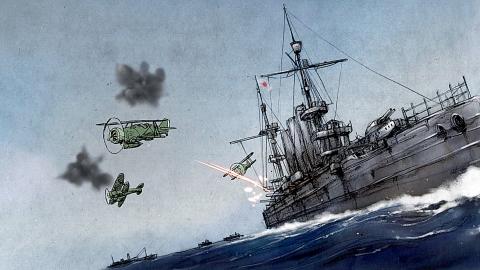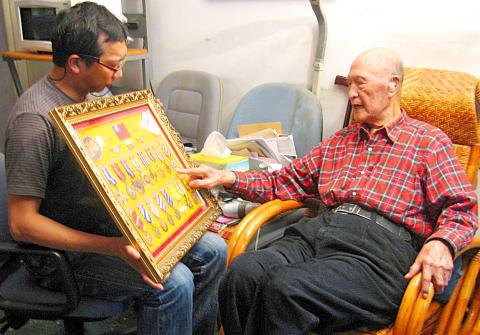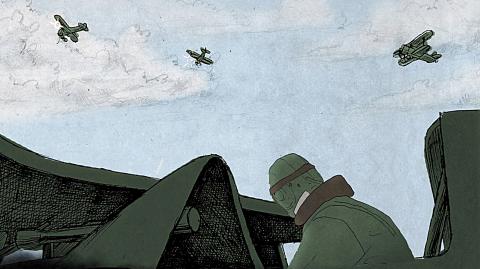Several documentaries made over the past year have examined the legacy of World War II. Song of the Reed (蘆葦之歌), for example, chronicles women who were forced into sexual slavery during the war, while Wansei Back Home (灣生回家) sheds light on the lives of Japanese citizens born in Taiwan during the colonial period from 1895 to 1945.
At first glance, The Rocking Sky appears to be just another version of the first generation of Chinese air force pilots who were trained to fight against imperial Japan’ superior forces.
On closer look, however, director Chang Chao-wei (張釗維) and his crew offer rare insight into the past through interviews with 40 surviving pilots and their relatives in Taiwan, China and Hong Kong. Personal narratives are brought to the forefront through letters, poems, photographs and interviews.

Photo courtesy of CNEX Studio Corporation
The filmmakers emphasize the role of women, revealing the cruelty of war through the eyes of female writers and academics who lived through the period.
While the choice of female writers gives the film a pronounced literary tone, actor Chin Shih-chieh (金士傑) brings further nuance to the film’s emotional core as the off-screen narrator.
The Rocking Sky begins in 1932, just after the Republic of China founded the Central Aviation School in Jianqiao, Hangzhou, in anticipation of an all-out war with Japan. Upon entering the academy, one would see the school’s motto, which reads: “Our bodies, planes and bombs shall perish along with the enemies’ troops, vessels and fortifications.”

Photo courtesy of CNEX Studio Corporation
“No other aviation school in the world would have a motto like this,” the off-screen narrator says.
During the Second Sino-Japanese war, 1,700 Chinese pilots took to the skies, and among them, every six out of 10 gave their lives during the early phase of the war.
The film delves into the lives of celebrated pilots and their heroic deeds.

Photo courtesy of CNEX Studio Corporation
Through the memoir by Chi Pang-yuan (齊邦媛), a prominent Taiwanese author, the struggle of pilot Chang Ta-fei (張大飛) as he faced death on a daily basis quietly emerges. A close friend of Chi’s family, Chang once mentioned to the then young writer that he could never forget the expression of panic on the face of a Japanese pilot he shot down.
After a good friend went on a mission and never returned, Chang wrote to Chi, and said that he knew he would be next.
“I pray and meditate. I feel peace in my heart,” he said.
The pilot was killed during a mission at the age of 26.
By the end of the war, over 4,000 Chinese pilots had perished. Asking what this figure actually means, the film cites a poem by academic Lin Hui-yin (林徽因), who had become a mother figure to eight young pilots, all killed during the war.
Lin’s poem, spoken with real feeling by film director and actress Sylvia Chang (張艾嘉), ends with the following lament:
“You are still just a child but there is nothing that you haven’t given. Millions of people have already forgotten. For whom you have died for?”

This month the government ordered a one-year block of Xiaohongshu (小紅書) or Rednote, a Chinese social media platform with more than 3 million users in Taiwan. The government pointed to widespread fraud activity on the platform, along with cybersecurity failures. Officials said that they had reached out to the company and asked it to change. However, they received no response. The pro-China parties, the Chinese Nationalist Party (KMT) and Taiwan People’s Party (TPP), immediately swung into action, denouncing the ban as an attack on free speech. This “free speech” claim was then echoed by the People’s Republic of China (PRC),

Exceptions to the rule are sometimes revealing. For a brief few years, there was an emerging ideological split between the Democratic Progressive Party (DPP) and Chinese Nationalist Party (KMT) that appeared to be pushing the DPP in a direction that would be considered more liberal, and the KMT more conservative. In the previous column, “The KMT-DPP’s bureaucrat-led developmental state” (Dec. 11, page 12), we examined how Taiwan’s democratic system developed, and how both the two main parties largely accepted a similar consensus on how Taiwan should be run domestically and did not split along the left-right lines more familiar in

Specialty sandwiches loaded with the contents of an entire charcuterie board, overflowing with sauces, creams and all manner of creative add-ons, is perhaps one of the biggest global food trends of this year. From London to New York, lines form down the block for mortadella, burrata, pistachio and more stuffed between slices of fresh sourdough, rye or focaccia. To try the trend in Taipei, Munchies Mafia is for sure the spot — could this be the best sandwich in town? Carlos from Spain and Sergio from Mexico opened this spot just seven months ago. The two met working in the

Many people in Taiwan first learned about universal basic income (UBI) — the idea that the government should provide regular, no-strings-attached payments to each citizen — in 2019. While seeking the Democratic nomination for the 2020 US presidential election, Andrew Yang, a politician of Taiwanese descent, said that, if elected, he’d institute a UBI of US$1,000 per month to “get the economic boot off of people’s throats, allowing them to lift their heads up, breathe, and get excited for the future.” His campaign petered out, but the concept of UBI hasn’t gone away. Throughout the industrialized world, there are fears that